
On the final stretch of the afternoon, on August 4th, 2020, a massive and terrible explosion shook the lives of every Lebanese person. On this day everything changed. The kind of change that disrupts the course of major rivers and entirely reshaped life as the Lebanese knew it. It changed my life forever. But it started out just like most summer days, I was to meet my friends downtown in Beirut. It was a happy day, until 6:04 pm, when my life flashed before my eyes.
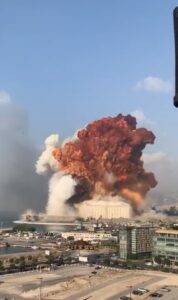
About half an hour earlier, as I was on my way to meet my friends, I heard that a huge fire started at the Beirut Sea Port. On the news, I could see fierce fires with firefighters and first responders rushing to the scene. Everything seemed to be under control. When minutes later, a deafening blast rocked the country and the blazes spread into other warehouses injuring most and killing many on its path. Astonished by the frightening scene, I froze in place with tears running down my cheeks. Paralyzed by the frightful sound of the explosion, my first thought was about my mother. I immediately tried to call but was disconnected. No matter how many times I redialed the number, I could not get through to her. Everything seemed surreal and everybody stunned in disbelief. Suddenly, the whole building started shaking as if there was an earthquake. Then I felt as if I was struck by a storm. A fierce blast followed the shaking. This shock wave tumbled us onto the ground. Windows shattered all around, ceilings crumbled, and furniture debris splattered everywhere. Time stood still at 6:04 pm. My thought went right back to my mother. Where is she? Is she hurt? Is she still alive? Suddenly, I received a call from her. Her call gotten through to me, but for the first time in my life, I could barely recognize her voice. She was paralyzed with fear. She could not stop crying and yelling. Everyone around her was covered in blood, screaming from pain and feeling lost, confused, traumatized. Running around trying to look for a way out. They could not believe their eyes; the most unexpected thing that could happen to them, had just happened. Shattered glass everywhere, walls and ceilings destroyed, people completely disoriented; they were lost in the place despite this being the place they knew where they had lived their whole lives. My mother was helped up by one of her coworkers. He helped her and some others to the car. Physically, she was not hurt, however, one of her coworkers was severely injured by broken glass. Everything was so fast, so chaotic, she lost sight of him. That is all she remembers.
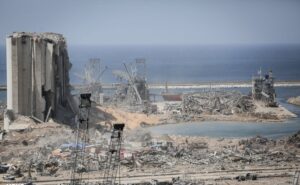
Laying in my bed all night, eyes wide open, just thinking. Trying to process the disaster. Today, I cannot remember my first night after the tragedy. I cannot remember whether I ever slept that night. I dared not think about what happened. I was too scared of what the following days would bring.
The worst part was not the explosion, but what I saw afterwards. Flashbacks kept coming back to me. I will never forget the amount of blood that was on the floor, the number of people who were screaming for help, or the dead bodies everywhere. I did not feel lucky at all, I only felt a guilt that took over me. I felt guilty because I was not hurt like so many other people. Guilty because my house was not completely destroyed. Guilty because my loved-ones were still here. Guilty because I was still alive. Why did I not lose everything? Why was I the lucky one? Yet, none of this felt lucky at all? This is when I realized that life was unfair. The only thing that I was able to do was to go down to the streets and help my fellow citizens. My guilt, however, turned into anger. I was furious, not just with myself, but with the corrupted government who was aware that we had 2,750 tons of highly explosive ammonium nitrate in our port for seven years and never thought for a minute that it should be moved or secured.1 Furious by the lack of government planning to rescue people. Furious about the government’s absence. Had the explosion struck the government, causing it to go missing, while taking thousands of innocent lives, separating families, and leaving loved ones nowhere to be found? Or were the government and our leaders absent purposefully?
The recent history of Lebanon meanders in complex ways to get us to the situation today. To understand the circumstances, I share important historic background. Lebanon was founded as a country with eighteen officially recognized religious denominations. Christianity and Islam form the two largest groups. Muslims are divided into two sects; Sunni and Shia, together they represent 67.7% of the population while 32.4% of Lebanese are Christians. Lebanon shaped democratic parliamentary institutions based on secularism. Yet, political parties in Lebanon overlap with religious affiliations and sectarian roots. Christians lead The Free Patriotic Movement (Tayyar) and the Lebanese Forces (Ouwet), Shia Muslims have Hezbollah and Amal, and Sunni Muslims support The Future Movement.2 Each of these parties historically had commitments and alliances with neighboring regimes and even links to states beyond the region. For example, France, notably, supported Christians, while Egypt and Saudi Arabia bolstered Sunnis, and while Iraq and Iran favored Shia Muslims. Lebanon suffered from from these divisions that brought long term civil conflicts and prevented it from strengthening its national political power and sovereignty.
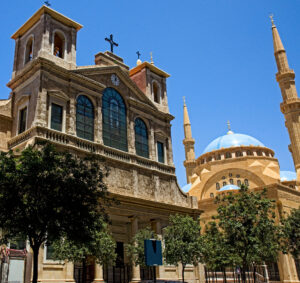
The tensions in Lebanon began to rise in 1975 linked to the many dynamics the Israel and Palestine conflict. Muslims, mainly Sunnis, had been backing Palestinians, while Christians prioritized Lebanon’s independence. These events led to the 1975 civil war in Lebanon. Lebanese Muslims took the side of the Palestinians and fought against Lebanese Christians.3 Arab countries entered into the conflict which ignited further powder kegs when Syrians were to negotiate the peace initiative. In 1989, the war came to an end. The Taif Agreement, which was negotiated in Saudi Arabia and approved by the Lebanese parliament on November 4, 1989, intended to end the civil strife in the country.4 This agreement consisted of Lebanon’s principle of coexistence which aimed to ensure that power was shared equally between Shia, Sunni, and Christians. Rafic Hariri was one of the leading architects of the agreement. The president of the country had to be a Maronite Christian, while the Prime Minister had to be selected amongst Sunni Muslims and the speaker of the Parliament had to belong to the group of Shia Muslims. This agreement also included requiring Syrian troops to withdraw from Lebanon in two stages over two years. However, Syria still occupied Lebanon until 2005.5 On February 14, 2005, Rafic Hariri was assassinated. The citizens of Lebanon were furious and blamed it on Syria. 6 On April 14, 2005 the Cedar Revolution that brought together protesters against the prime minister’s assassination brought an end to Lebanon’s short lived stability.7 The United Nations intervened and passed the resolution 1559 mainly calling for Syria’s immediate withdrawal following the assassination of former Prime Minister Rafic Hariri on February 14th, 2005, in a car bomb attack in downtown Beirut. Syria was forced to leave immediately due to allegations of their involvement in the assassination of Hariri.8 His killer was never confirmed; however, some accused Hezbollah of being responsible for it.
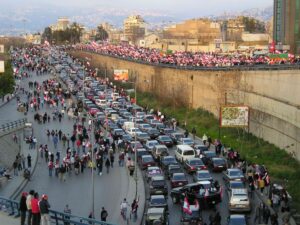
This tragedy divided Lebanon into two camps: those who believe Syria and Hezbollah were behind the death of Rafic Hariri, and those who did not.
In the sequence of unfolding events, Lebanon has been in a rut since late 2019 when the economic crisis hit. Many factors led to the country’s current situation. The biggest reasons were corruption by the government and political instability. The country has been enduring a political crisis, especially following the explosion of 2020 with the resignation of prime minister, Saad Hariri.9 The country has struggled forming a new government majority because of the multitude of religious and political differences. Citizens of Lebanon unveiled some real government conspiracies and exposed the extent of the corruption of so many elected and appointed leaders in the previous decades. This led to bankruptcy, unsafe streets, and a huge economic crisis that increased poverty and hunger. The chaos did not only disrupt peace in the streets, it also invaded our homes when the devastating explosion in Beirut Sea Port rattled every home, shattered most windows miles away and spread further challenges.
In 2019, Lebanon entered a steep economic crisis never witnessed in its long history. This crisis has deep roots resulting from successive governments policies which failed to rebuild Lebanon due to their corrupted agendas, their misleading monetary and lending policies (taking loans) for over 30 years where the money was going to the politicians pockets instead of developing the nation’s infrastructure and the economy, and the dependency on importing goods instead of locally manufactured ones; all disruptive policies, which led to Lebanon draining the treasury from foreign currencies and robbing the savings of Lebanese people in banks to cover and pay for their corruptive policies and eventually placing Lebanon among the poorest countries in the world. 10 A sharp devaluation of the Lebanese pound exacerbated economic woes when it lost more than 90% of its value. In 2021, the inflation rate in Lebanon was 154.76%, a 69.89% increase from 2020.11 This issue emerged as a humanitarian crisis in the country with people struggling to feed their family and often unable to meet basic human needs as these became unaffordable. The citizens of Lebanon were desperately seeking everyday necessities. Before the crisis, refugees suffered immensely already and their situation further deteriorated since. This lead to a significant increase in suicides across the country as parents struggled to meet their children’s basic needs.12 A story that circulated at my school described how a father hung himself one morning because his daughter asked him for fifty cents to buy a sandwich for school and he could not even give her that. My heart aches.13 Under these circumstances one can understand that it led Lebanese people to start a Revolution on October 17, 2019. The protests began because of planned taxes on gasoline, tobacco and applications like WhatsApp, however, it quickly spread into a country-wide condemnation of sectarian rule, of the stagnant economy, and rising unemployment, all made worse by the exposure of government corruption. The protests ignited a political and economic crisis in the country. 14
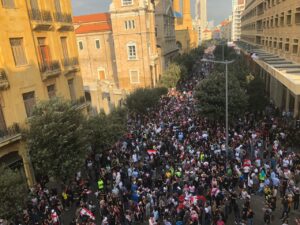
The COVID-19 pandemic drove desperation ever deeper for the country. The Lebanese people were badly affected; many more citizens lost their jobs. Lebanon reached its highest level of poverty and unemployment in the country, while inflation skyrocketed. The protests gave Lebanese hope, however, the people needed to eat, they needed to take care of themselves. This revolution lasted for a while, but did not result in anything other than additional chaos. The system made them hopeless. The population found itself trying to live day by day, fighting for the minimum and simply trying to survive.15 Lebanese struggled gaining access to basic human needs, medication, and healthcare, and finally power or electricity. Lebanon has always faced electricity outages, however, due to the economic crisis, the outages have been worse. Some areas only receive an hour of electricity per day. The shortage of fuel and the incompetency of the government remain responsible for many challenges faced in Lebanon.16
Lebanon will always be my home. It is the place where I find my greatest joy, security and comfort, regardless of the circumstances. Leaving my country will forever be my hardest choice. I believe that Beirut will rise again from the ashes and punishment will come to those who deserve it or heavenly justice will take its course.
- Ashraf Farahat et al., “Possible Overestimation of Nitrogen Dioxide Outgassing during the Beirut 2020 Explosion,” Remote Sensing 14, no. 24 (January 2022): 6377, https://doi.org/10.3390/rs14246377. ↵
- “Politics of Lebanon,” in Wikipedia, March 19, 2024, https://en.wikipedia.org/w/index.phptitle=Politics_of_Lebanon&oldid=1214572225. ↵
- Amanda Ufheil-Somers, “Israel in Lebanon, 1975-1982,” MERIP, September 11, 1982, https://merip.org/1982/09/israel-in-lebanon-1975-1982/. ↵
- Joseph Bahout, “The Unraveling of Lebanon’s Taif Agreement: Limits of Sect-Based Power Sharing,” Carnegie Endowment for International Peace, accessed April 4, 2024, https://carnegieendowment.org/2016/05/16/unraveling-of-lebanon-s-taif-agreement-limits-of-sect-based-power-sharing-pub-63571. ↵
- Joseph Bahout, “The Unraveling of Lebanon’s Taif Agreement: Limits of Sect-Based Power Sharing,” Carnegie Endowment for International Peace, accessed April 4, 2024, https://carnegieendowment.org/2016/05/16/unraveling-of-lebanon-s-taif-agreement-limits-of-sect-based-power-sharing-pub-63571. ↵
- “Factbox: The Assassination of Lebanon’s Hariri and Its Aftermath,” Reuters, August 4, 2020, sec. World, https://www.reuters.com/article/idUSKCN2500LQ/. ↵
- Ersun N. Kurtulus, “‘The Cedar Revolution’: Lebanese Independence and the Question of Collective Self-Determination,” British Journal of Middle Eastern Studies 36, no. 2 (August 1, 2009): 195–214, https://doi.org/10.1080/13530190903007251. ↵
- UN Security Council (59th Year: 2004), “Resolution 1559 (2004) /: Adopted by the Security Council at Its 5028th Meeting, on 2 September 2004,” September 2, 2004, https://digitallibrary.un.org/record/529421. ↵
- Tamara Qiblawi Wedeman Ghazi Balkiz,Ben, “Lebanon’s Hariri Steps down as Prime Minister-Designate Pushing Crisis-Ridden Country Further into Uncertainty,” CNN, July 15, 2021, https://www.cnn.com/2021/07/15/middleeast/hariri-resigns-lebanon-intl/index.html. ↵
- “Lebanon: Almost Three-Quarters of the Population Living in Poverty | UN News,” September 3, 2021, https://news.un.org/en/story/2021/09/1099102. ↵
- “Lebanon Inflation Rate 2009-2024,” accessed April 4, 2024, https://www.macrotrends.net/global-metrics/countries/LBN/lebanon/inflation-rate-cpi. ↵
- Natasha Hall, “The Importance of Marginalized Communities in Lebanon” (Center for Strategic and International Studies (CSIS), 2020), https://www.jstor.org/stable/resrep27649. ↵
- AsiaNews.it, “Bekaa, Father Commits Suicide Because He Cannot Feed His Children,” accessed April 6, 2024, https://www.asianews.it/news-en/Bekaa,-father-commits-suicide-because-he-cannot-feed-his-children-48707.html. ↵
- “Lebanon Protests: Thousands Demand ‘Fall of the Regime’ in Beirut,” Al Jazeera, accessed April 4, 2024, https://www.aljazeera.com/economy/2019/10/18/lebanon-protests-thousands-demand-fall-of-the-regime-in-beirut. ↵
- Assaad Thebian, “Corruption, Protest, and Hope in Lebanon,” Journal of International Affairs 73, no. 2 (2020): 239–46, https://www.jstor.org/stable/26939980. ↵
- “Lebanon Left without Power as Grid Shuts Down,” October 9, 2021, https://www.bbc.com/news/world-middle-east-58856914. ↵
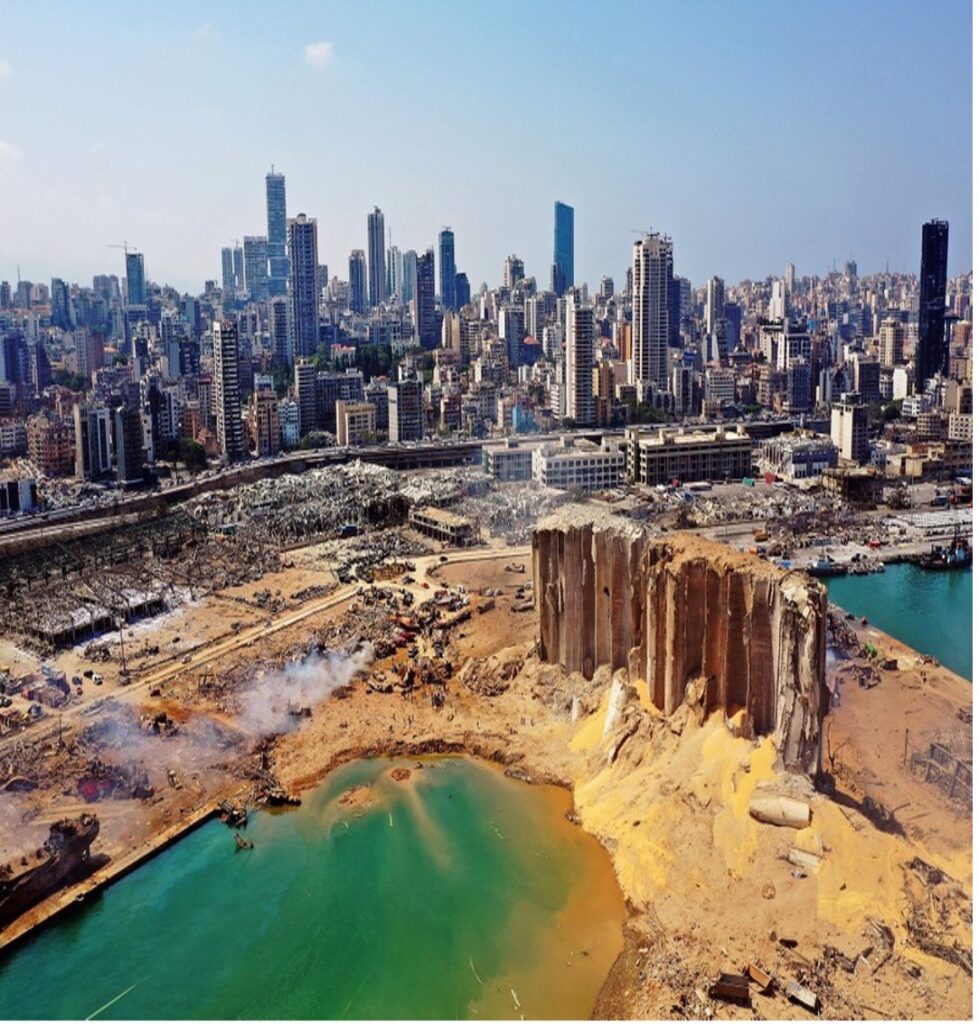
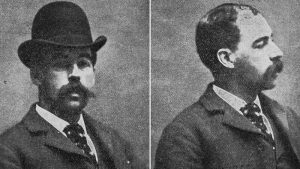
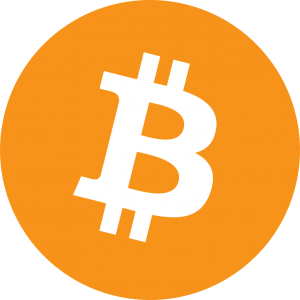
7 comments
Kaitlyn Villanueva
Wow, what a story to read. This was so powerful and broke my heart just hearing about the tragedy that these people had to go through. Your article shows every side of the story and allows the reader to really grasp the importance of this event. The usage of background information also lets the reader understand the reasoning behind such a tragedy like this one.
Jordan Robbins
Hi, through your writing I learned so much more about the Beruit situation. I do remember this happening but it felt like not much information came out and like it was just forgotten. You explained the whole this like a newscaster and its so well written! What made you decide to write about this?
Silvia Benavides
Your article vividly illustrates the tragedies that occurred. I am sorry to hear how it has affected your life and others. I appreciate you sharing your story in this wonderfully written article.
Carlos Anthony Alonzo
Beirut’s crises showcases a city hitting rock bottom. Economic collapse, political dysfunction, and societal unrest has amounted into a drastic suffering of their people. There should be urgent international aid and a group effort to recover Beirut to a state better than it was. The is a hard wake up call that underscores the need for reforms in the systems that regulate society and a growing effort to fix Beirut as soon as possible. Great article!
Mariana Chamorro
Naya, your piece about the Beirut explosion is really touching and informative. The personal stories make it easy to relate to what people went through during that tough time. Plus, the historical background helps understand why things happened the way they did. Overall, it’s a great read that’s both emotional and enlightening.
Sebastian Hernandez-Soihit
Your article paints a vivid picture of the horror and chaos that unfolded that day. It’s saddening to hear how it changed your life and the lives of so many others forever, I come from similar background- you have my sympathy. Your courage and resilience in the face of such tragedy are inspiring and you should know that. Well written article
Esmeralda Gomez
Hi Naya! This was such a heart-breaking story to read. The terrible Beirut tragedy has been felt everywhere, and when news broke first on American news, I truly felt for those who were impacted. I share your aspirations that Beirut will recover in time and seek justice for those who allowed this tragedy to occur in the first place. Your writing eloquently captures the gravity of this significant and traumatic event that affected thousands upon thousands. Excellent job.